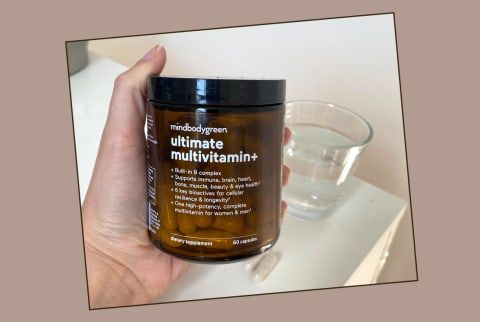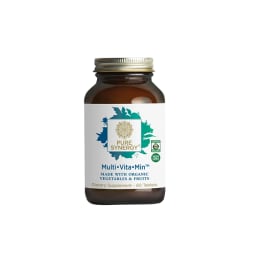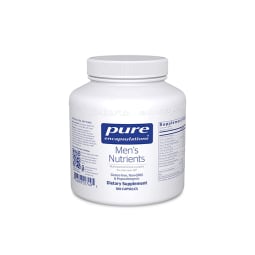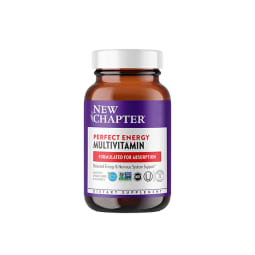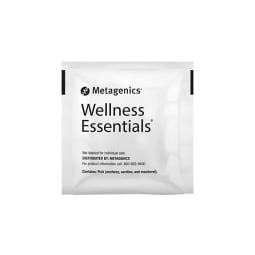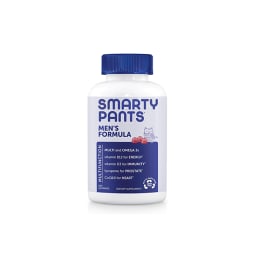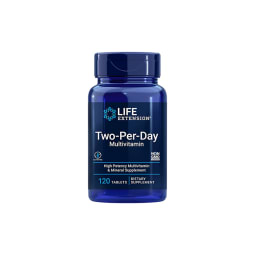A balanced, colorful diet will offer you a portion of what you need, but research demonstrates that there are still many nutrient gaps you can’t fill with food alone. That’s where a high-quality, well-formulated multivitamin comes in—to provide your body with sufficient amounts of important nutrients. “What’s more, some innovative multivitamins now also include other healthful botanical phytonutrients and bioactives to provide even more comprehensive and diverse areas of health support in the ease of a daily multi ritual,” explains nutrition scientist Ashley Jordan Ferira, Ph.D., RDN. While men don’t necessarily require a different multivitamin than women, selecting a targeted supplement can take your wellness routine to the next level, supporting your unique needs to work toward your healthiest self. Not sure where to start? These are the best multivitamins for men—plus, why they’re worth integrating into your nutrition lifestyle Not only can a comprehensive multivitamin help you achieve nutritional sufficiency for micronutrients (which many of us aren’t!), but they’re also an easy way to know you’re doing something good for your body. Of course you’ll still need to eat a balanced diet to reach your macro needs (carbs, protein, fat), stay hydrated, and infuse regular movement into your routine to feel your best—but a multi can help add those missing pieces to the larger puzzle. Think of it as a prudent, proactive investment for today and your future. That being said, gendering your multivitamin is not necessarily essential, and while there are slight variations in the micronutrient needs between men and women (except for the perinatal period of life, of course), these multis end up having minimal differences in the long run. “Many gender-siloed multivitamin formulas do silly things that are actually a detriment to men’s nutritional health, and thus, whole-body health. Like reducing or entirely cutting out essential minerals like calcium, iron, and others,” Ferira shares. “In contrast, there are smart multivitamins that are inclusive in their formulas to fulfill the nutritional needs of men and women in one product.” Plus, you can save 10% on your first order with promo code MBG10. If you do follow a vegetarian or vegan diet, it may also be worth checking that your multi contains a complete B vitamin complex (i.e., all eight essential B vitamins) as these nutrients are notoriously difficult to get enough of through plant-based eating. The most premium multivitamin options will provide bioactive forms of B vitamins, including methylated folate and vitamin B12. Iron and iodine are also essential ingredients to keep an eye out for if you follow a plant-centric approach to eating. As for dosage, you’ll want to look for multivitamins with high-potency formulas because this ensures meaningful doses of the micronutrients are actually included. As a rule of thumb, in a complete multivitamin formula, a full array of vitamins and minerals will be included at or above 100% of the daily value. Some bulkier macrominerals specifically, such as calcium, magnesium, and potassium, are so large that they will be included at lower doses to fit into the product, but they should still ideally be present (since these three minerals are some of the largest nutrient gaps in our nation!). Look out for multivitamins that “sprinkle” nutrients, botanical extracts, or other bioactives. Ferira likens this less-than-savory practice to “nutritional name-dropping,” which she says, “might look good on the label but isn’t included in meaningful enough amounts to actually be helpful nutritionally or based on clinical research.” In terms of the packaging your multi comes in, we’re fans of sustainable and effective options. “I am a strong proponent of packaging that’s recyclable, doesn’t introduce more plastic into our planet, and also protects the precious ingredients you’re paying for,” says Ferira. “For that combination of environmental impact and buffering your multi ingredients from UV light, amber glass fits the bill,” she adds. As for morning or evening, it’s really up to you and when you think you can actually stick to your routine. “In general, most people are more likely to stick with taking a multivitamin first thing in the morning,” Bethany Doerfler, RDN, a clinical research dietitian at Northwestern Memorial Hospital, once told mbg. But taking a multi with breakfast might not jibe for you. As Ferira previously shared with mbg: “For certain people, the morning is simply not an ideal time to take their multivitamin because some individuals’ stomachs can’t tolerate such a hefty mineral load in the initial hours of the day.” She further explains that “personalized nutrition honors these individual differences and pivots one’s approach,” which is why she takes her daily multi with lunch.



